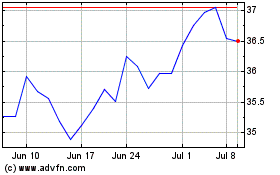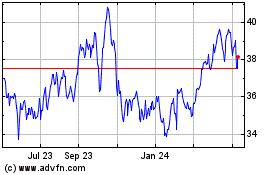Shell Profit Battered by Weak Oil Prices -- 3rd Update
February 04 2016 - 10:18AM
Dow Jones News
By Sarah Kent
LONDON-- Royal Dutch Shell PLC Thursday reported its worst
profits in over a decade and said its reserves of oil and gas were
depleting as a hefty decline in global oil prices continued to
hammer the energy industry's earnings.
Shell's fourth quarter-profit tumbled almost 60% to $1.8 billion
down from $4.2 billion a year earlier, on a current
cost-of-supplies basis--a number similar to the net income that
U.S. oil companies report. Its profit for the year dropped 80% to
$3.8 billion, compared with $19 billion in 2014.
Adding to the pressure, its reserves dropped 20% in 2015. Shell
said low oil prices forced it to slash 1.4 billion barrels from the
volume of oil and gas it expects to develop.
Big oil companies frequently struggle to replace the oil they
pump each year, but it is unusual for reserves to actually decline.
BP said this week that it replaced 61% of its reserves in last
year, and Chevron has said its reserve replacement ratio was
107%.
As dismal as that results sound, they were better than some
analysts and investors expected, reflecting the malaise weighing on
the energy industry with crude-oil prices down more than 70% since
their June 2014 peak. Shell shares rose about 6% Thursday.
Helping its stock price was Shell's comments that it wouldn't
lower its dividend of $1.88 in 2016, although it declined to give
guidance on future years. Chief Financial Officer Simon Henry said
the company would take "prudent measures" on its dividend
policy.
Standard & Poor's ratings had downgraded Shell's credit
rating Monday, in part because the company has been unable to cover
its capital spending and dividend payouts from cash.
Shell's results came on the same day that ConocoPhillips said it
would slash its dividend 66%, only the second large oil and gas
producer to take such a step after Italy's Eni SpA trimmed payouts
last year. Elsewhere, Norway's Statoil ASA reported a surprise loss
of 9.2 billion Norwegian kroner ($1.8 billion) in the fourth
quarter, even worse than its loss of 8.9 billion kroner a year
earlier.
The latest results capped a week of poor financial performance
by the world's largest oil companies as a 20-month slide in the
price of oil eroded earnings for 2015. Shell's rival U.K. oil
giant, BP PLC, reported a loss of $5.2 billion in 2015, on par with
the hit it took after its Gulf of Mexico blowout in 2010. Chevron
Corp. and Exxon Mobil Corp. posted their weakest annual results in
more than a decade.
The fall in oil prices has hammered big oil companies' ability
to generate profits from their oil and gas production. Shell's
exploration and production business lost $5.7 billion last year,
hit by falling prices, lower volumes and sizable losses on the
value of its assets.
The company said its oil production business brought in 48% less
in 2015 compared with 2014 and revenue generated from natural gas
fell 27%. Volumes of oil and gas tumbled 4% to 3 million barrels a
day in the year, dented by a mixture of divestments, expiring
licenses, security issues in Nigeria and limitations on output from
a giant gas field in the Netherlands.
The decline in the company's proved reserves throws into
question its ability to maintain that level of production in the
future. The company is preparing to close a roughly $50 billion
acquisition of BG Group PLC, which is intended to address some of
the weaknesses displayed in its 2015 performance. The acquisition
is expected to increase the company's output by around 20% and
bolster reserves by around 25%.
"While not entirely comfortable with a negative number, it's not
the most important thing on the results today," Shell's chief
Financial Officer Simon Henry told reporters on a conference call,
noting the positive impact the BG acquisition of BG is expected to
have on the company's volumes. "That doesn't mean it's not an issue
over time, but the BG deal gives us--together with our own
assets--more choice and more certainty," he said.
The company said the acquisition will also refocus its strategy
as one of the world's largest liquefied natural gas producers and a
major player in deep water oil projects, providing it with a
platform to bring down its break-even costs. The completion of the
deal, expected Feb. 15 will mark "the start of a new chapter in
Shell, rejuvenating the company, and improving shareholder
returns," Chief Executive Ben van Beurden said in a news
release.
The company has come under criticism from investors and analysts
for the price it is paying for its smaller rival amid the steep
slide in oil prices.
Write to Sarah Kent at sarah.kent@wsj.com
(END) Dow Jones Newswires
February 04, 2016 10:03 ET (15:03 GMT)
Copyright (c) 2016 Dow Jones & Company, Inc.
BP (NYSE:BP)
Historical Stock Chart
From Mar 2024 to Apr 2024

BP (NYSE:BP)
Historical Stock Chart
From Apr 2023 to Apr 2024
